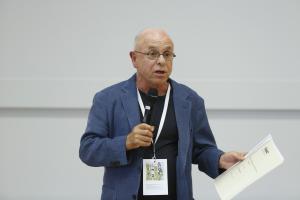In the name of SIOE's board (award was presented by Bob Gibbons)
The Elinor Ostrom Lifetime Achievement Award is given every other year for sustained significant academic contributions to the field. This year’s winner was Pablo Spiller, the Jeffrey A. Jacobs Distinguished Professor in Business and Technology, Emeritus, at Berkeley’s Haas School of Business.
In addition to being (a) the first ISNIE/SIOE conference organizer to have the conference dinner on a cruise boat, (b) the first ISNIE/SIOE President to be an expert at the tango, and (c) the first PhD economist born in Uruguay, Pablo also has made fundamental contributions to ISNIE/SIOE in three domains: intellectual, institutional, and interpersonal.
Intellectually, Pablo has made lasting contributions to three themes related to SIOE. The first theme, and the earliest focus in his research, concerns competition (and lack thereof). Here there are papers in IO, regulation, and antitrust. This theme is clearly related to SIOE, but in future work Pablo would not only move closer to SIOE’s core but even contribute to reshaping SIOE.
The second theme, and roughly the middle period of Pablo’s research, is very importantly in the core of SIOE because it combines Pablo’s economics research training and approach both with political science and with law. The overarching topic of this second theme is politics (with a small “p”) and the many politicians who practice it (basically, all of us). Here there are two papers in AJPS (one with the glorious title “Amateur legislators, professional politicians”) and others in law journals, with topics such as decision-making on the Supreme Court or a multiple-principals theory of regulation (acknowledging politicians and interest groups, as well as the regulator, as principals).
Finally, the third intellectual theme is commitment (and lack thereof), especially the institutional foundations of regulatory commitment. Whereas work in the second theme helped deepen the intersections in SIOE’s disciplinary Venn diagram, work in this third theme opened a new frontier for SIOE—a frontier very much in keeping with SIOE’s focus on law, political science, economics, and institutions. Indeed, like other powerful ideas, it soon became clear that this focus on commitment issues had legs—i.e., applications beyond the regulatory process, such as to contestability of not only public but also private contracts.
Turning to institutional contributions, of course Pablo served in the sequence of officer positions from Vice President to President-Elect to President, running the conference as President-Elect, but his contributions to complementary institutions were equally important. For example, Pablo was Editor-in-Chief of JLEO, and he ran the Williamson Seminar at Berkeley, and he co-founded and ran (with Stephane Saussier) the Berkeley-Paris (now Berkeley-Padua-Paris) conference in organizational economics (now in its eighth year).
Finally, and in some ways most important and most impressive, Pablo’s interpersonal contributions are extraordinary. The outpouring of warm and grateful testimonials both from scholars closely connected to Pablo and even from those relatively remote from him was notable—confirming Pablo Spiller has an eminently appropriate recipient of the Ostrom Award.

